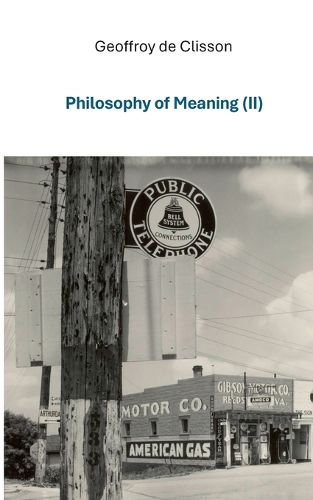Readings Newsletter
Become a Readings Member to make your shopping experience even easier.
Sign in or sign up for free!
You’re not far away from qualifying for FREE standard shipping within Australia
You’ve qualified for FREE standard shipping within Australia
The cart is loading…






This title is printed to order. This book may have been self-published. If so, we cannot guarantee the quality of the content. In the main most books will have gone through the editing process however some may not. We therefore suggest that you be aware of this before ordering this book. If in doubt check either the author or publisher’s details as we are unable to accept any returns unless they are faulty. Please contact us if you have any questions.
The philosophy of meaning is structured around four main axes: knowledge, aesthetics, ethics, and identity. By engaging with the question of the emergence of consciousness, it examines the logical limits of materialism and reductionism, and offers a critique of physicalist monism in favor of a reimagined dualism -one grounded in the discontinuity between matter and meaning, a discontinuity that alone makes possible the emergence of objective discourse. At the heart of this approach lies the idea of an original openness of being to the world - a silent exposure to what is external to it, preceding language, logic, and any form of representation. Three central dimensions of experience can thus be explored on the basis of this primordial structure: aesthetics, through music, as an immediate access to the articulation between the sensible and the significant; ethics, as a fundamental questioning of the relationship to otherness that precedes the normative concerns of morality; and identity, conceived as a dynamic dialectic between openness and the gathering of being. These domains are not separate fields, but each, in its own mode, expresses the structure of a radical dualism- the condition for any formal production, any act of thought, and any possibility of understanding the world. Underlying it all is an attempt to reconcile science and humanism through a philosophy of form, freedom, and spirit.
$9.00 standard shipping within Australia
FREE standard shipping within Australia for orders over $100.00
Express & International shipping calculated at checkout
This title is printed to order. This book may have been self-published. If so, we cannot guarantee the quality of the content. In the main most books will have gone through the editing process however some may not. We therefore suggest that you be aware of this before ordering this book. If in doubt check either the author or publisher’s details as we are unable to accept any returns unless they are faulty. Please contact us if you have any questions.
The philosophy of meaning is structured around four main axes: knowledge, aesthetics, ethics, and identity. By engaging with the question of the emergence of consciousness, it examines the logical limits of materialism and reductionism, and offers a critique of physicalist monism in favor of a reimagined dualism -one grounded in the discontinuity between matter and meaning, a discontinuity that alone makes possible the emergence of objective discourse. At the heart of this approach lies the idea of an original openness of being to the world - a silent exposure to what is external to it, preceding language, logic, and any form of representation. Three central dimensions of experience can thus be explored on the basis of this primordial structure: aesthetics, through music, as an immediate access to the articulation between the sensible and the significant; ethics, as a fundamental questioning of the relationship to otherness that precedes the normative concerns of morality; and identity, conceived as a dynamic dialectic between openness and the gathering of being. These domains are not separate fields, but each, in its own mode, expresses the structure of a radical dualism- the condition for any formal production, any act of thought, and any possibility of understanding the world. Underlying it all is an attempt to reconcile science and humanism through a philosophy of form, freedom, and spirit.